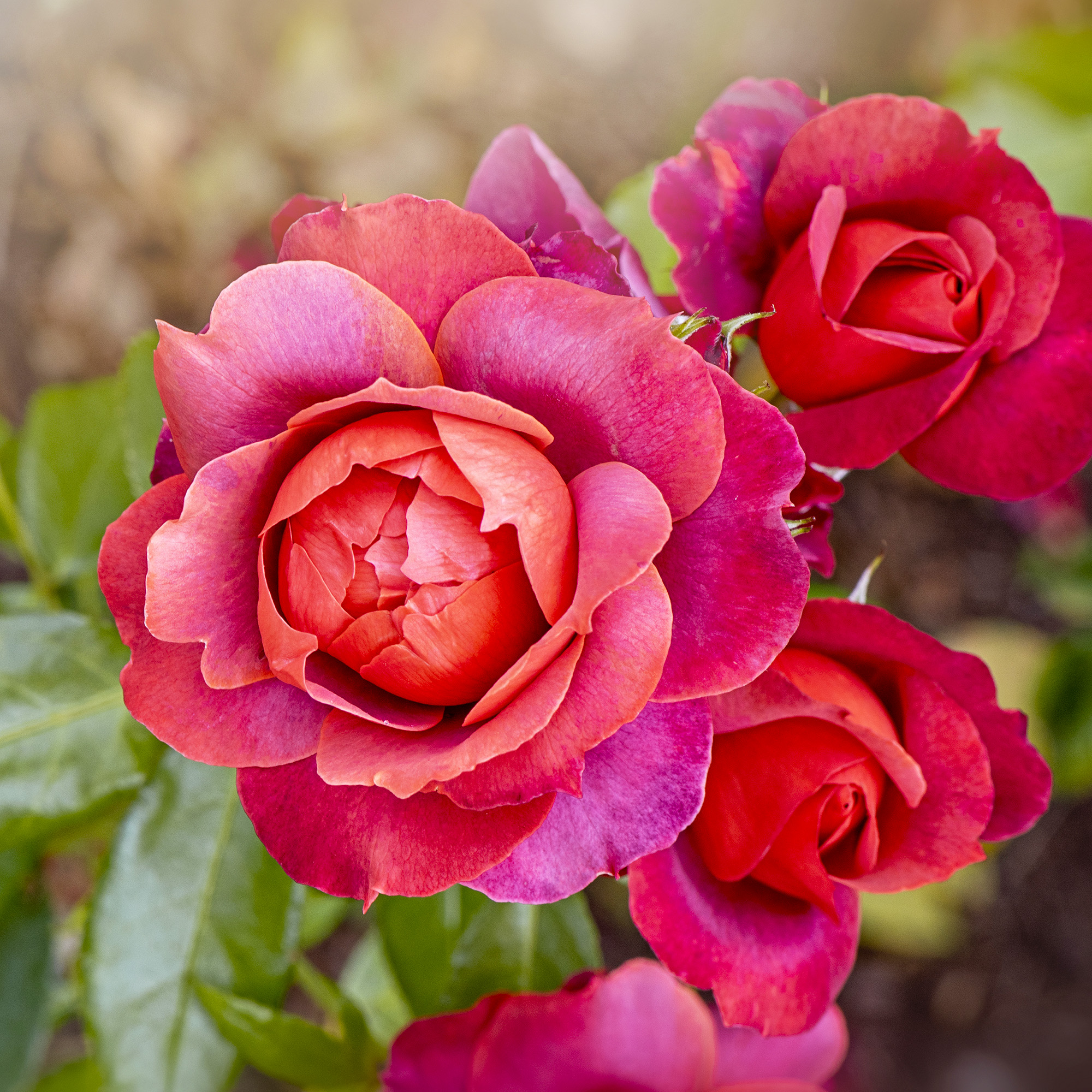Best Mulch For Roses: An Expert Guide To Choosing & Applying The Right Type
Give your roses the perfect foundation by choosing the best mulch to boost nutrients, retain moisture, and protect plants from weeds and frost.
Melanie Griffiths
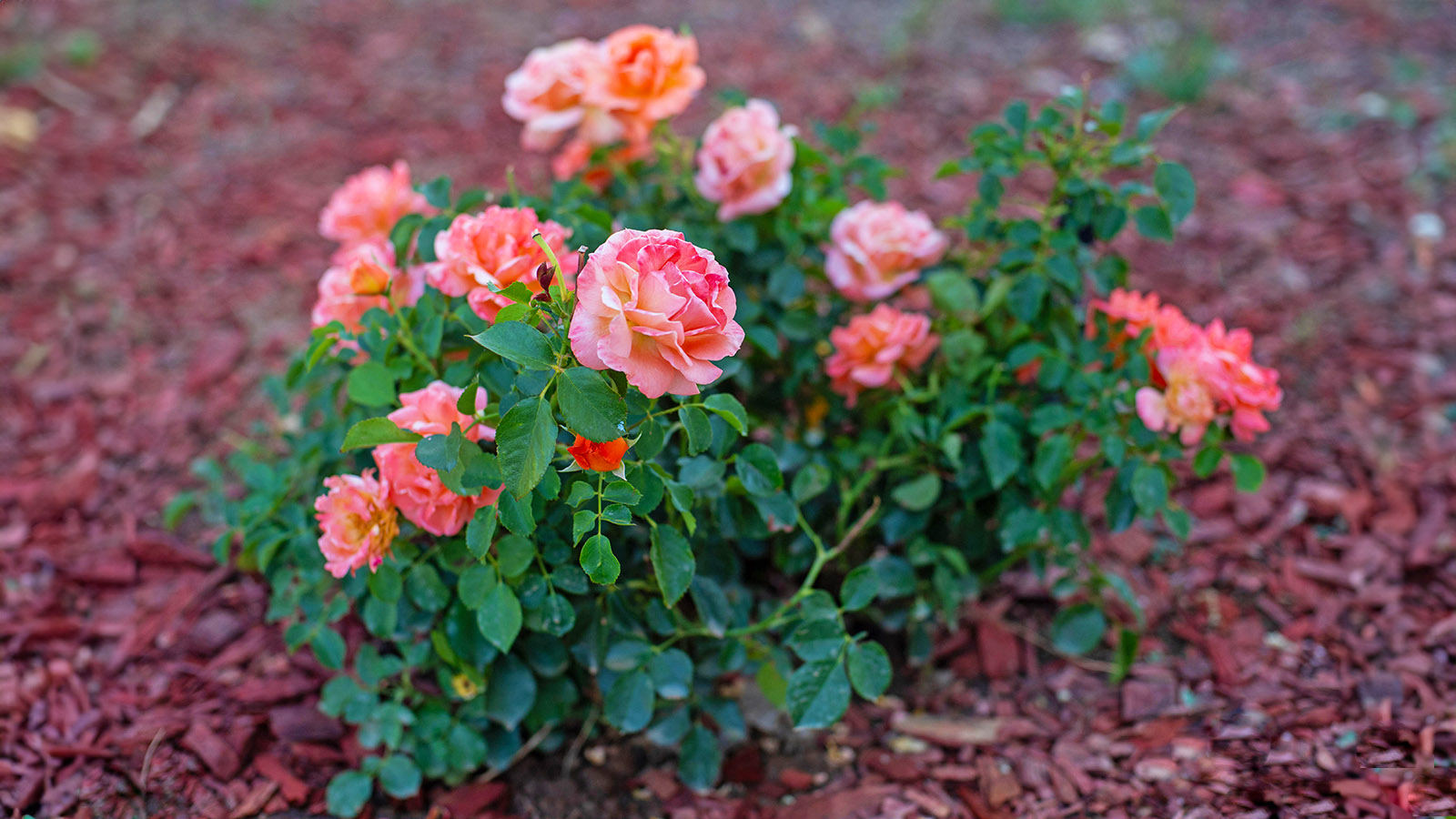
Like many other plants, roses can greatly benefit from occasional mulching. But, to ensure these prized shrubs reach their potential, you need to choose the best mulch for roses – and know when and how to apply it.
Roses need a lot of water, and this is one of the most important reasons to mulch them. It can be difficult to keep enough moisture in the soil to keep your roses happy and blooming, especially in summer. The right mulch helps the soil retain that vital moisture, reducing the volume of necessary watering.
A vital part of learning how to grow roses is protecting them from winter cold. Some types of roses are hardier than others, but most can be damaged in prolonged cold periods. If you live in a colder USDA hardiness zone, then it's important to choose a quality mulch that can offer this extra protection. In addition, it will help to suppress weeds, which compete with your plants for water and nutrients.
What is the Best Mulch for Roses?
Many types of garden mulch can be used for roses, but natural mulch is typically the best option as it will enrich the soil with nutrients as it breaks down over time.
There are several inorganic mulch options, which are longer lasting and effective at suppressing weeds, but they do not add nutrients to the soil, and in some cases, such as with plastic sheeting, can suffocate the soil.
Here are some different mulches to consider.
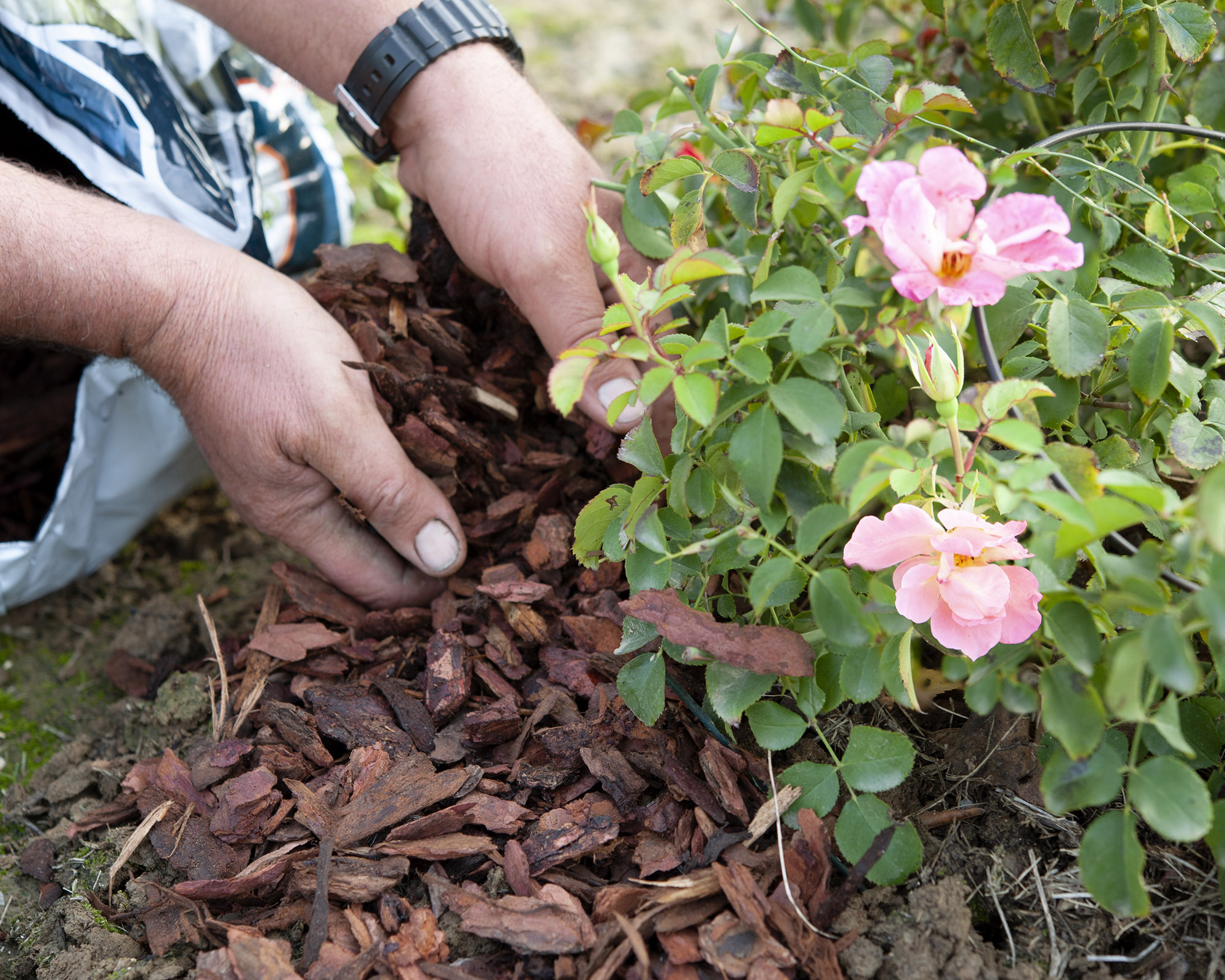
Shredded Bark
Shredded bark mulch is a good option for roses. It breaks down more quickly than wood chip mulch, but it also adds more nutrients to the soil. It's effective at retaining moisture and suppressing weeds and helps keep roses' roots warm without overheating. Shredded mulch can be easily moved to one side with a rake during granular feedings and then moved back in place afterward.
Sign up for the Gardening Know How newsletter today and receive a free copy of our e-book "How to Grow Delicious Tomatoes".
However, application is key. Shredded bark mulch should ideally be 2 to 3 inches (2.5 to 7.5cm) deep – any deeper will make it harder for water and air to penetrate the soil. You must also leave a small gap of around 2 to 3 inches (2.5 to 7.5cm) around the base of the roses to avoid rot and pest problems. Many gardeners add an extra dose of nitrogen-rich fertilizer to roses when using bark mulch, as it can temporarily deplete levels in the soil as it decomposes.
When choosing the type of bark to use, consider aesthetics, longevity, and sustainability. Cedar, pine, spruce, and hemlock are different types of bark mulch that are all effective options. Cypress is also widely available but is less sustainable due to deforestation. In terms of longevity, pine will degrade much more quickly than other options – just 1 or 2 years, compared to an average of 5 years for other types.
Wood Chips
Wood chip mulch is made from a variety of hardwood and softwood trees, and has a lovely natural look that differs depending on the tree species used. Common hardwood trees used for mulch include oak, maple, hickory, beech, and ash. Eucalyptus is also an option, but it contains certain chemicals that are potentially toxic, so it is best avoided as a mulch for roses. Softwood trees that make good mulch include pine, cedar, spruce, or fir.
Your choice of tree type will likely be influenced by what is available locally. If you have access to a wood shredder, you can make your own mulch using garden waste. Alternatively, wood chips are often available for free or at low cost from municipal tree-trimming programs.
Wood chip mulch lasts longer than shredded bark and offers good moisture retention, temperature regulation, and weed suppression. However, like bark it depletes nitrogen from the soil as it decomposes, making it unsuitable where roses are paired with annual flowers, which need lots of nitrogen to grow.
Again, apply the mulch to a thickness of 2 to 3 inches (2.5 to 7.5cm), leaving a gap around the base of the shrub to prevent rot and discourage rose pests.
Be careful about where you get your mulch and how cheap it seems as well. There have been cases where some diseased trees were cut down and shredded into mulch, and then used by unsuspecting gardeners.
In some of those cases, entire gardens and pets became sick. Checking out the mulch you plan to use in your garden or rose bed first can pay you some big rewards by keeping things happy, healthy, and looking as beautiful as you want them to.
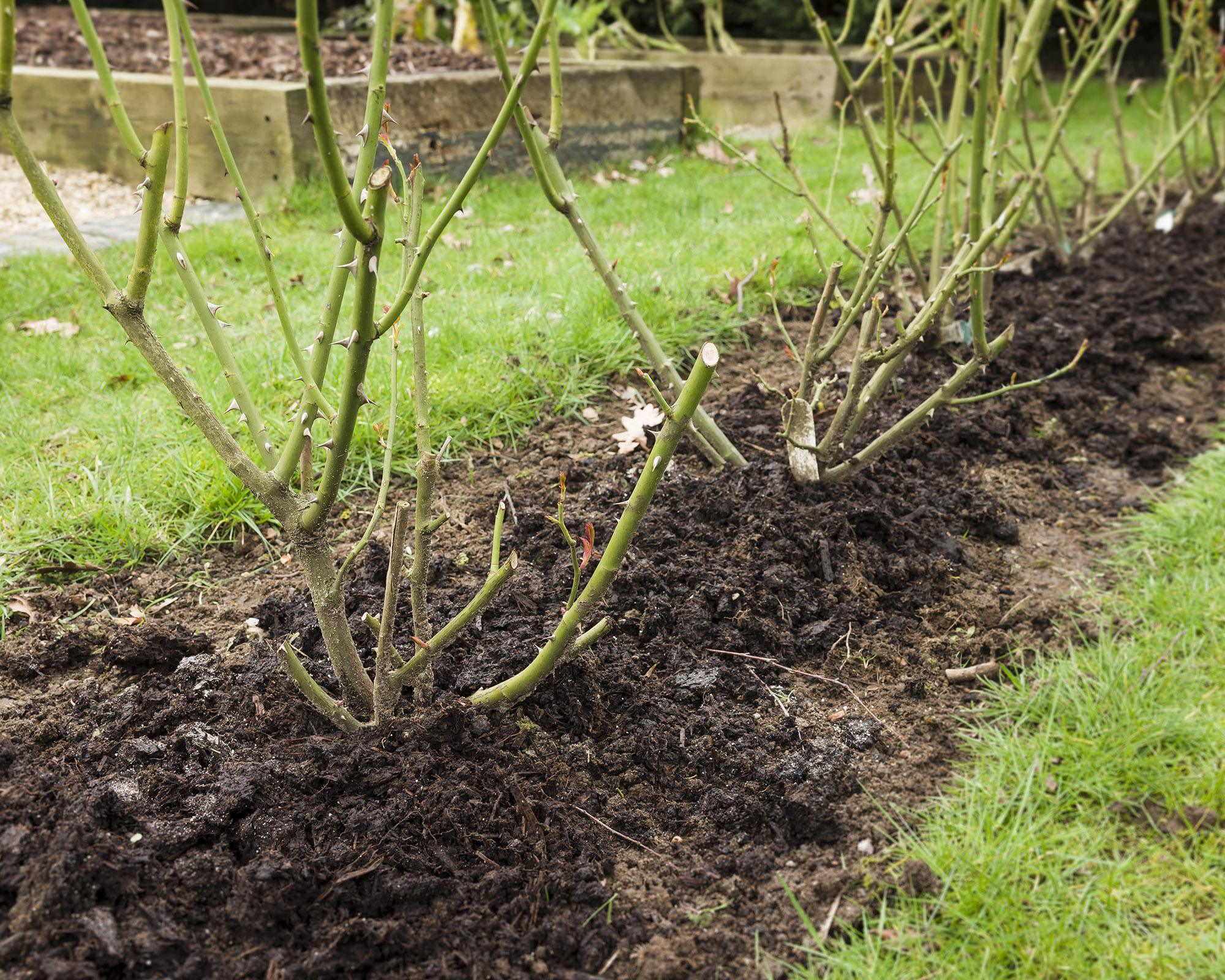
Compost
Using compost as mulch for roses – or a compost-like soil improver – is a simple way to boost plant health while keeping garden beds looking neat. Compost feeds the soil, giving roses a steady supply of nutrients. It also helps retain moisture, while keeping roots cool in summer and insulated in winter. Plus, it encourages beneficial soil life, from earthworms to microbes, all working to improve structure and drainage.
The key is applying it right. Spread a 1 to 2-inch (2.5 to 5cm) layer around the base of your roses, keeping a small gap around the stems to prevent rot. You can use homemade compost or a well-aged soil improver from the garden center.
The drawback of compost is that it decomposes quickly, so you’ll need to refresh it a couple of times a year.
Other Organic Mulches
Several organic materials can potentially work as mulch for roses, and if you have them in your yard, these are inexpensive options too.
Pine needles can make good mulch for roses as they have the potential to acidify soil slightly – a useful trick for growing roses in more alkaline soil. They are also slow to break down, although they may blow away in exposed windy sites.
Straw or hay mulch can help to retain moisture and will decompose quickly to enrich the soil. This makes it a perfect solution for overwintering roses. However, straw and hay can contain weed seeds if not properly sourced.
Yard waste, such as grass clippings and leaf mulch, may also be applied if the goal is to protect roses over winter. As they decompose, they will release nutrients into the soil.
Using well-rotted manure as mulch gives roses a rich, natural boost while improving soil structure and locking in moisture. The key is ensuring it's aged, as fresh manure can burn roots or introduce weeds.
You may have heard of mint mulch for roses, but this product is really more like compost. It’s a byproduct of harvesting and extracting oil from mint plants. It adds nutrients to the soil and retains a minty smell that may deter some pests, so you can certainly use it with roses.
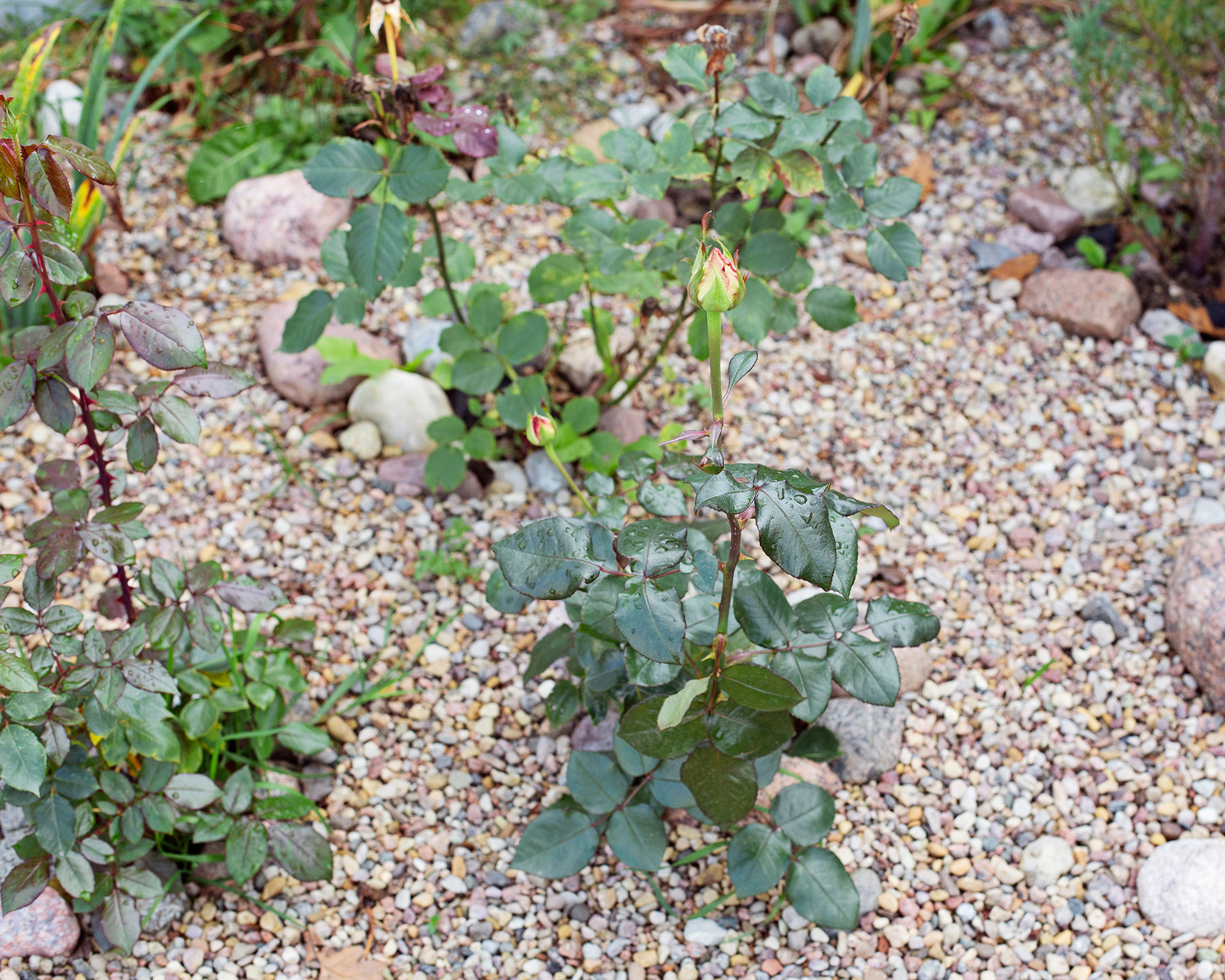
Gravel Mulch
Gravel much is a popular inorganic option that looks in keeping with certain landscaping designs. One benefit is that it lasts a lot longer than organic materials. It won’t break down and it doesn’t dislodge easily. On the other hand, it won’t add any nutrients to the soil as organic mulch does. Gravel is also difficult to work around if you need to get to the soil.
Gardeners in warmer zones should think twice about gravel, as it can absorb the sun's rays, causing the soil to overheat and dry out in hot weather. Although in cooler zones, this shouldn't be an issue.
To fertilize roses mulched with gravel, sprinkle the feed over the gravel, rock the gravel back and forth a bit with a hard tooth rake, and then water it in well.
You can also add organic matter by sprinkling some bagged top dressing over the gravel and watering it in.
The Best Mulch for Potted Roses
Potted roses can also benefit from mulching for many of the same reasons roses planted in beds need mulch. While weeds are usually less of an issue in containers, maintaining moisture in the soil is even more important. Any of the types of mulch you would use in a bed can be used in a pot.
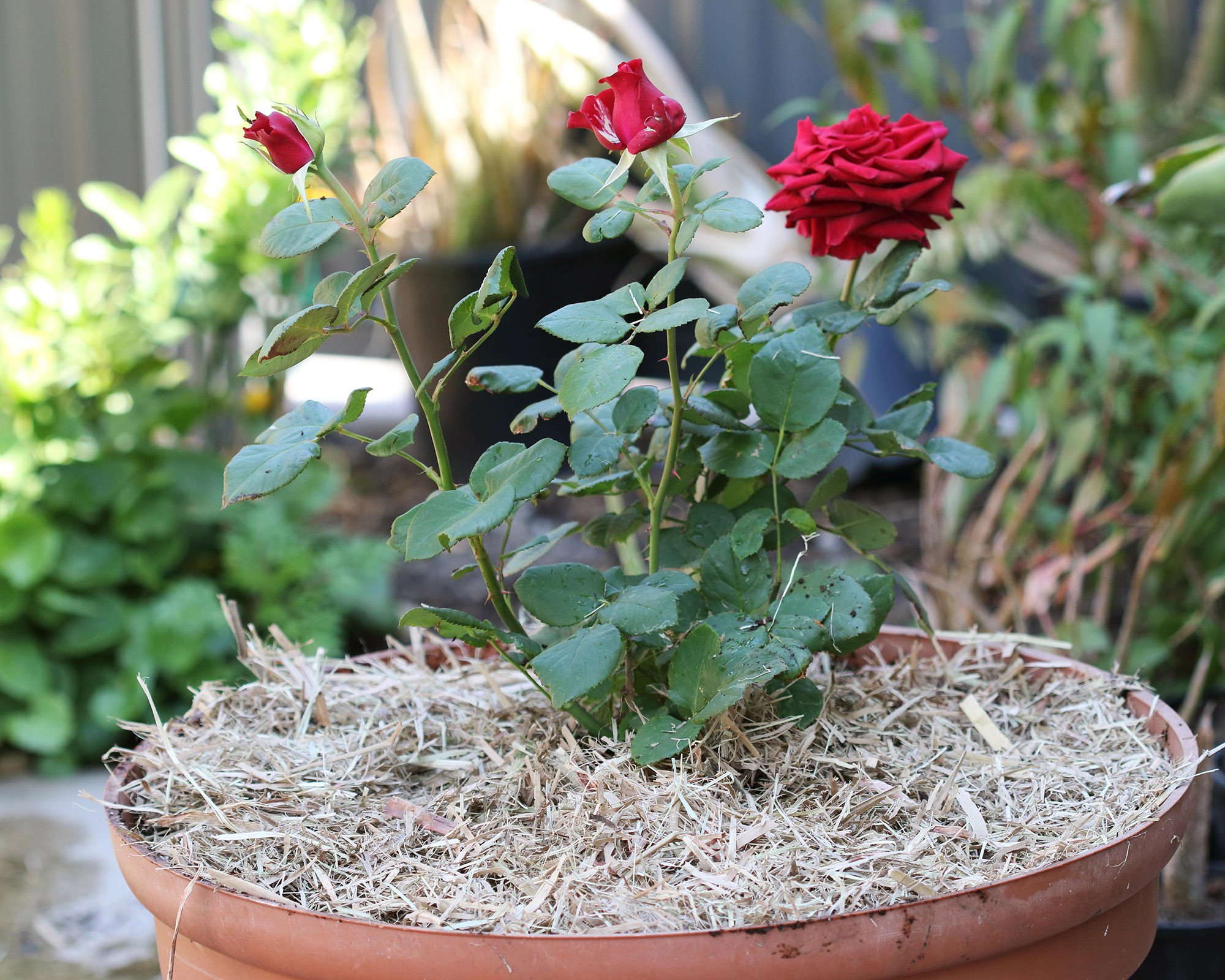
When to Mulch Roses
You can mulch roses at any time of year. It’s especially important to mulch in spring to prepare roses for the growing season. You can add additional mulch as needed throughout the year. Winter is also a good time to mulch roses as protection from the cold.
How to Mulch Roses for Winter
Mulching roses in winter protects them from harsh conditions and damaging fluctuations in temperature. Mulch is better than a protective rose cone or extra topsoil. The particles of mulch trap insulating air between them.
- Start by cleaning up your plants in fall, removing leaves and other debris, and pruning damaged canes.
- Make a mound of mulch around the base of each rose plant to a depth of six to eight inches (15 to 20cm).
- Cover the mulch with a layer of soil to keep wind from blowing it away.
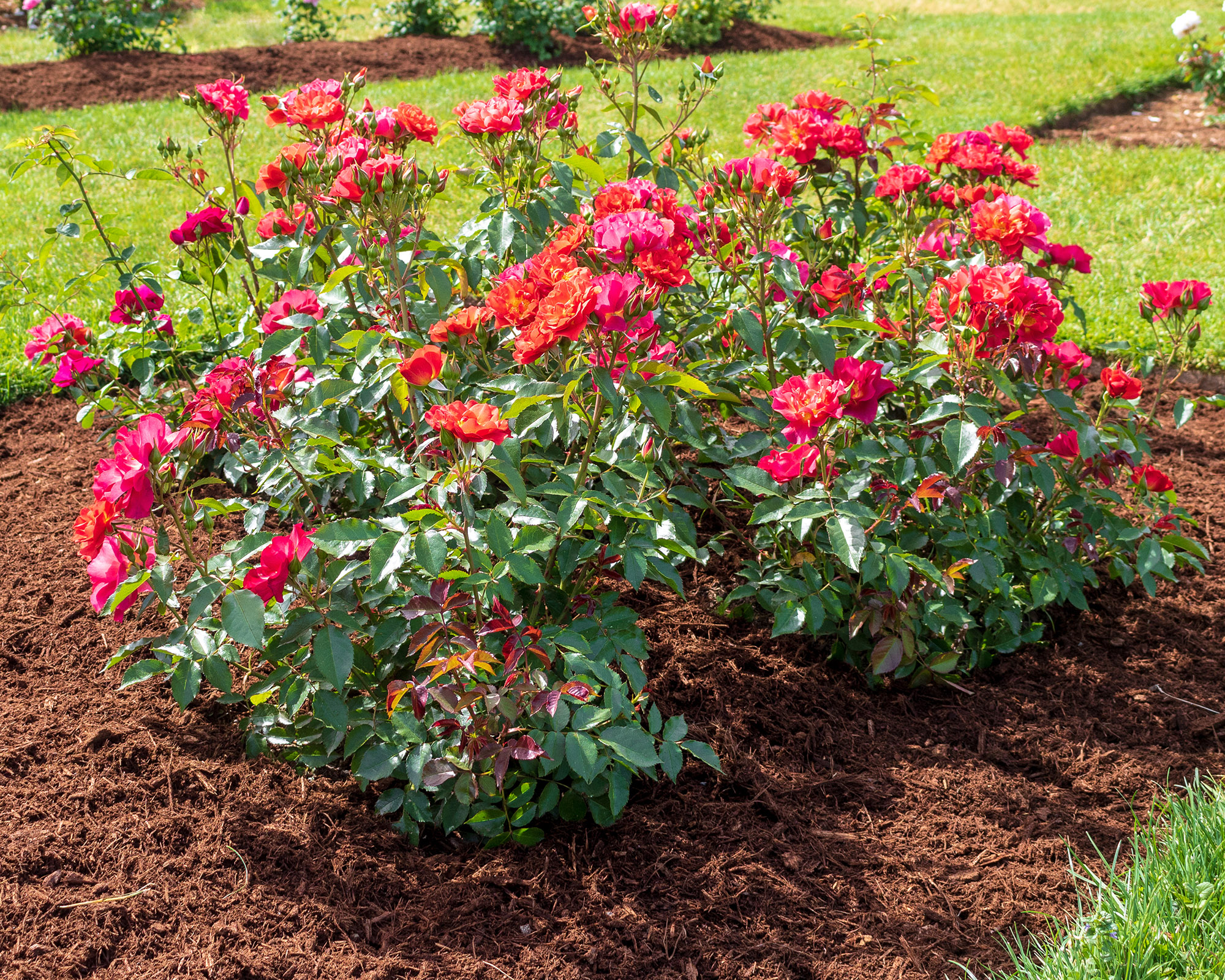
How to Mulch Roses in Spring
In early spring or late winter, mulch after pruning roses to give them the best possible start to the growing season.
- Begin by preparing the soil. Remove any debris left from the previous fall and pull any weeds that have emerged.
- Amend the soil or add compost if necessary.
- Apply a layer of mulch around the roses to a depth of two to three inches (5 to 7.5cm).
- Leave a small ring around the rose bushes free of mulch. You’ll use this area for watering.
More Rose Inspiration
- Browse show-stopping plants in the Gardening Know How Shop – from glorious roses to native evergreens.
- Roses not looking their best? Learn how to save a rose with 8 fixes for failing shrubs.
- Nothing frustrates rose growers more than black spot. Discover 6 natural black spot remedies for roses.
- Grow more roses from cuttings with this easy method for foolproof results.
- Browse beautiful roses in the Gardening Know How Shop, each selected for their beauty and resilience.

Stan V. Griep contributed to Gardening Know How for many years and has been a Colorado Native Rosarian for over four decades. He is an American Rose Society Certified Consulting Master Rosarian in the Rocky Mountain District, and a member of the Denver Rose Society, the Loveland Rose Society, and the American Rose Society. He is Gardening Know How's in-house expert on all things roses.
- Melanie GriffithsEditor in Chief


